Behind the scenes: How we produce The Scotsman in lockdown
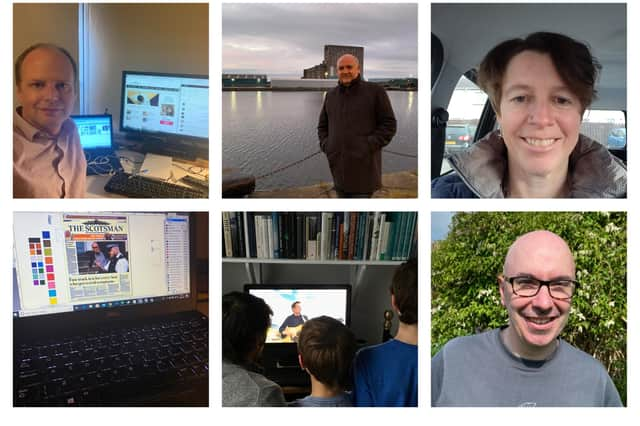

Just how do you cover the biggest story since the Second World War with staff scattered across the country working from kitchen tables and spare rooms?
Here, some of our journalists give a behind-the-scenes glimpse into how we have kept working.
‘The new normal’
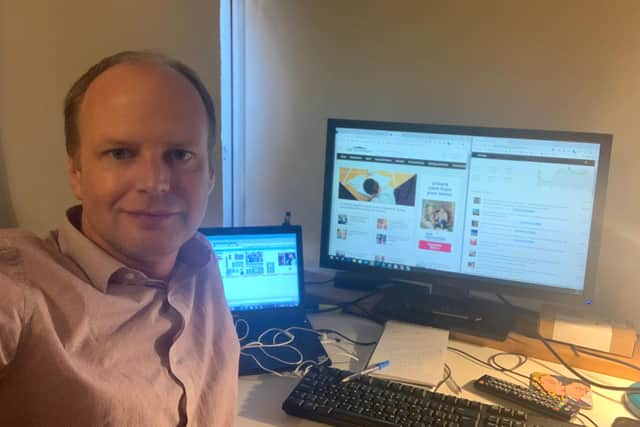

ALAN YOUNG
HEAD OF CONTENT
Advertisement
Hide AdAdvertisement
Hide AdWhen Boris Johnson announced lockdown in the evening on 23 March, it had already been an incredibly busy news day for our editorial staff. Just hours earlier the former first minister Alex Salmond had been cleared in court, an extraordinary story which in normal times would have dominated the news agenda north and south of the border. Not that day.
You would have expected our offices at Orchard Brae House on Edinburgh’s Queensferry Road to have been a bustling hub of activity as lines were debated, reaction sought from across the political spectrum, backgrounders prepared, pages redrawn and our websites constantly updated. Again no.
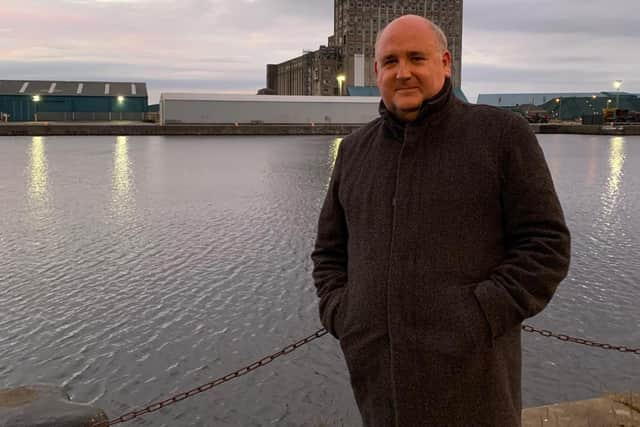

When the Prime Minister delivered that historic TV address, our newsroom was all but deserted.
The staff of The Scotsman, Edinburgh Evening News, and Scotland on Sunday had already begun remote working, with just a handful of desk editors left in the building. In a few days time, they too would decamp to their ‘temporary’ offices at home.
What would have been unthinkable just a few weeks previously – producing our websites and titles without a physical newsroom – had now become a daily reality. And this at a time when the newspaper industry as a whole is facing a fight for survival, paradoxically when what we do is needed more than ever.
We have adapted as everyone has to the new normal, with a determination to serve our readership to the best of our ability, to inform, hold those in power to account, and hopefully entertain along the way.
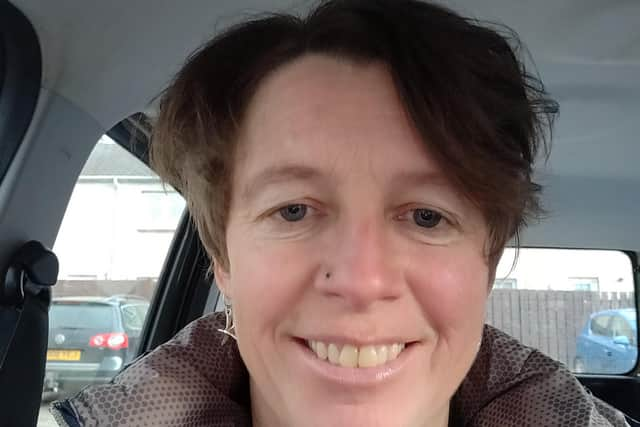

Out have gone editorial meetings in the conference room, interupted by senior executives. In have come virtual chats where it is small children and pets who are more likely to make an unexpected appearance.
A big breaking story is now announced with the ping of a Google chat message rather than a shout across the newsroom. Our political journalists in Edinburgh and London put questions to the government at daily briefings by Zoom. Instead of music and arts reviews we have commissioned video performances from some of the people we'd been planning to cover, and (incredibly) we are still producing an excellent sport section every day with no live sport.
Advertisement
Hide AdAdvertisement
Hide AdAlong the way we have said goodbye to colleagues leaving for pastures new and welcomed new recruits into the business – all via video chat. When we finally do get back together again, it will feel very strange indeed. But until then we go on, with heartfelt thanks to all of our loyal readers and subscribers both online and in print.
‘It feels like so many stories are yet to be told’


BRIAN FERGUSON
ARTS CORRESPONDENT
The train was eerily quiet as I made my way to Glasgow for my first ever encounter with Sir Billy Connolly. It was my last face-to-face interview.
By the end of that day, back in mid-March, my working world was unravelling. A looming ban on large gatherings had thrown venues and event organisers into turmoil.
All of Scotland's museums, galleries, theatres and concert halls were closed a few days later. Festival cancellations then began coming in thick and fast. I felt like throwing away my diary.
The most common question I’ve been asked since is: “What do you write about now?”
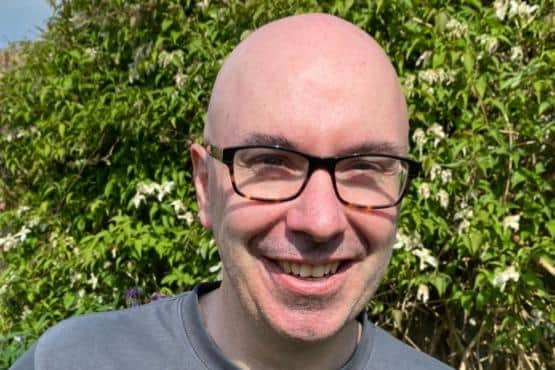

In reality, my working life has been non-stop - and it feels like so many stories are yet to be told.
Hardly a day goes by without news of another major event being cancelled or postponed. Some companies are only beginning to publicly confront the prospect of job cuts in the face of huge losses of income.
No-one has been able to announce reopening plans yet - whether within weeks, months or even the next year.In the meantime, I beam up into online debates and talks, seek out podcasts and keep an eagle-eye out for blog posts.
Advertisement
Hide AdAdvertisement
Hide AdThe weeks have flown by so fast I've not had long to dwell about when I last attended a cultural event in person. I'm now hopeful that a reunion with them won't be too far away - even if they're all outdoors initially. I can't wait.
‘Turns out we don’t need an office after all’
EMMA McGARVIE
PRODUCTION MANAGER
The paper always comes out, no matter what, I reminded myself as life unravelled around us and it became apparent that we were going to be putting out The Scotsman from our kitchen tables. Yes, it comes out - but not like this. From the office, not from the outside world.
Well so far so good - but it's not helped by having to endure the curse of rural broadband. I live a stone's throw away from Scotland's capital city yet there are seagulls living on rocks out in the Atlantic with higher broadband speeds than me. It makes it very difficult to get anything done quickly - tricky when you're working to very tight deadlines and also battling the vagaries of the remote system we work on. One minute everything's fine, the next you're looking at a blank screen as the pages we've been working on all night disappear into the void.
Communication is more difficult. The world of news moves rapidly and changes come thick and fast. It was much easier when you just turned to the folk sitting around you and divvied up who was doing what. Now everything is accompanied by a time lag which we can ill afford when trying to make last-minute changes to a page which somebody is just about to send to the printers. I used to be able to tell the person next to me: "Don't send page 5." Now I have to fire off emails, Google chats, Whatsapps, texts, go through to voicemail three times, and then sit. And wait. And hope. And compare myself to ground control at Nasa waiting for what feels like an eternity for an Apollo mission to re-emerge after going around the dark side of the moon.
We manage. In the great scheme of things, these are minor frustrations. It's the people that count after all and putting out a paper every night is what we're hardwired to do. Turns out we don't need an office after all.
‘Riding to the rescue came Scottish football and its uncanny ability to start an argument in an empty room’
GRAHAM BEAN
HEAD OF SPORT
They fell like dominoes, one sporting event after another, leaving us grasping at strange, peripheral events like they were the World Cup final.
Andy Murray playing the Madrid Open on his PlayStation. Darts pros taking on each other from the comfort of their own homes (until the wifi packed in). Irish horseracing meetings seemed to survive the lockdown longer than anything and don't think we weren't grateful. But when they too fell by the wayside, we knew the game up. There was, quite literally, no sport.
Advertisement
Hide AdAdvertisement
Hide AdThe hardest thing was getting your head around the fact you had 11 pages to fill and a website to feed and there wasn't a single live sporting event to help you.
Riding to the rescue came Scottish football and its uncanny ability to start an argument in an empty room. Pretty soon we were consumed by wrangling over when and how the season should end. The clubs had a vote, it was a farce and robust exchanges about league reconstruction soon followed.
It was all grist to the mill and suddenly those 11 blank pages didn't seem so daunting.
And then there was golf. It looked at first as if it might survive the sporting cull. The golf course seemed a safe haven, lots of space, lots of social distance. But no, it too bit the dust.
It seemed a little unjust and when it was announced that courses in England were to reopen before ours the view began to form that the Scottish golfer was getting a bit of a raw deal. Martin Dempster, our golf writer, tapped into all this and reported accurately and responsibly on the fast-changing situation.
It wasn't just Martin. Our sportswriters rose to the challenge, delivering news stories, interviews and opinion pieces, not from press boxes in sports grounds around the country, but tapped out on kitchen tables amid home schooling sessions with the kids.
At times it is tough. Everyone is working from home and there is no office hub. Everything is slower: technology, the sports news cycle, the jerky video press conferences via Zoom.But people get on with it. Their attitude is first class and they deliver the stories. Sport or no sport.
‘It’s forced us to work better as a team’
ELSA MAISHMAN
NEWS REPORTER
The biggest difference in local news reporting from home is not being able to meet the people you write about.
Advertisement
Hide AdAdvertisement
Hide AdOn the Evening News, we still pride ourselves in getting out onto the streets of the city as much as we can, talking to people, going to events and being able to see for ourselves the things we’re covering.
As key workers we’ve still been able to do that during lockdown, but we’ve kept it to a bare minimum in order not to unnecessarily endanger ourselves or others. There are fewer events to cover as many have been cancelled, but birthdays and anniversaries in particular have continued to go ahead, and we haven’t been able to go to every one.
This has meant more phone conversations, Zoom calls and people taking pictures of themselves when our photographers can’t get to them. Not being physically in the same room as colleagues makes communication a constant challenge, and it’s forced us to change several practices to try and work better as a team.
We now have two video meetings a day to plan our coverage, and are continuously in touch via Google Hangouts.
‘We’re doing not bad, not bad at all’
EUAN McGRORY
EDITOR (PRINT)
Not long before we went into lockdown, I was asked ‘can you put the papers out with no one in the office?’ My answer had to be short and simple, ‘I don’t know’.
Daily newspaper production is a minor feat in itself. Some of my colleagues are probably baulking right now at my use of the word minor.
Together, all the articles in The Scotsman alone amount to around 50,000 words, including news and sports reports filed from across Scotland, Britain and the world, and the prodigious output of our network of exceptional columnists, obituary writers and reader correspondents. In word count alone, that amounts to the equivalent of a short novel each day, often written and edited at speed.
Journalists have been producing the Scotsman from various offices across Scotland and in London for more than 200 years. Not being forced to do so, no one has been rash enough to attempt this working only from the bedrooms and kitchen tables of its staff. There were a hundred and one practical problems.
Advertisement
Hide AdAdvertisement
Hide AdHow would we for instance look at the hundreds of pictures that come into our PCs and have a decent conversation about which one is the best for the front page? What about the many conversations we need about the fast-changing news agenda? How would we properly decide which of the many, evolving news stories are the most important and how we should be approaching them, offering the all-important context, reaction and analysis?
Fast forward nearly nine weeks, and, spoiler, we’re doing not bad, not bad at all.
We are not alone in rising to these challenges of course. Like teams elsewhere, we have learned how to make the most of zoom meetings and online chat groups for everything from rapid information sharing to having a private offload and even ‘going to the pub’ together on a Friday night. Some things are just fundamentally different.
As I sit at my desk in my improvised bedroom office, I miss ‘the office’ quite badly at times. I miss the camaraderie and creativity of the newspaper office, the way some of the best ideas come when you are chewing the fat while getting the teas and coffees in.
There are some things that I love about my lockdown working life. Watching our resident blackbirds taking a bath, the chance to try to the best of my ability to help my daughters with their maths (I’m usually in the office when they are doing their homework), the enforced opportunity to take stock, and, just occasionally, a little more quiet time for thinking.
The most important thing for me through this pandemic has been keeping things going.
Asking the important questions of those in power, sharing inspiring stories of resilience and compassion, finding little things for our readers to smile about along the way, that’s what we’ve been doing. And, by doing that, it feels like we have been playing our part in helping our communities get through this all as best we can. As I look out my bedroom office window, seeing neighbours head out to work with the NHS and other essential service providers, that is the one thing that really matters to me about our work right now.
‘It’s a very short commute from the sofa bed in one corner to the desk in the other’
ANDY O’BRIEN
HEAD OF AUDIO VISUAL
Advertisement
Hide AdAdvertisement
Hide AdWhen the floor starts moving to the latest Joe Wicks’ workout, it’s time to crank up the computer. It’s 9am and our youngest child, 8 year old Louis, is busy doing his squat thrusts, accompanied by my wife, who is also working from home. Our two older girls, 12 and 14, get on with their schoolwork unsupervised, while probably dipping into YouTube, let’s not kid ourselves!
My wife and I have decamped into the front room to make way for my mother in law who joined us shortly before the lockdown began. This makes for a very short commute from the sofa bed in one corner to the desk in the other.
With two laptops and an extra screen up and running, I check the schedules to see what’s happening. They used to be quite detailed with news, politics, culture, royalty and sport, but now they often offer one subject only: Coronavirus watch.
Checking in via Google Chat with the rest of the team, who are also working from their homes around Edinburgh, and via phone with our photographers, Lisa in Edinburgh, John in Glasgow and Michael in Falkirk, we discuss the possibilities for photography and video.
The rest of the day is punctuated with Google Meetings and communications via Whatsapp groups to keep all the teams, from print to online, in the loop.
We are all logged into the same systems, looking at the same things from our various locations to fill the pages and decide on the best pictures to use – something we could not have imagined doing just a few weeks ago.
‘A temporary fix has come to feel like the new normal’
ROGER COX
ARTS AND BOOKS EDITOR
By the middle of March, with theatres and music venues about to go dark for the foreseeable, it was clear that the Scotsman's arts team was going to have to work in a different way; if there were no longer any live performances to write about, we would just have to commission video performances from some of the people we'd been planning to cover and write about those instead.
Our last live reviews appeared in The Scotsman on Monday 16 March. Then, on Friday 20 March, we released our first four Scotsman Sessions videos on scotsman.com with introductions written by our critics.
Advertisement
Hide AdAdvertisement
Hide AdTen weeks and 40 sessions later, what was supposed to be a temporary fix has increasingly come to feel like the new normal.
Filmed on smartphones in living rooms and back gardens all over Scotland, and spanning music, theatre, dance and comedy, the Sessions have been better than we could possibly have imagined.
Several writers have confessed to welling up on viewing an artist's home-made video for the first time, and my two boys (aged 7 and 9) have enjoyed the Sessions too, so while I might not have been the greatest home school teacher they will at least emerge from lockdown as fans of Tide Lines and with an appreciation of the gravity-defying hairstyle of Michael Pedersen.
A message from the Editor:Thank you for reading this story on our website. While I have your attention, I also have an important request to make of you.With the coronavirus lockdown having a major impact on many of our advertisers - and consequently the revenue we receive - we are more reliant than ever on you taking out a digital subscription.Subscribe to scotsman.com and enjoy unlimited access to Scottish news and information online and on our app. With a digital subscription, you can read more than 5 articles, see fewer ads, enjoy faster load times, and get access to exclusive newsletters and content. Visit https://www.scotsman.com/subscriptions now to sign up.
Our journalism costs money and we rely on advertising, print and digital revenues to help to support them. By supporting us, we are able to support you in providing trusted, fact-checked content for this website.
Joy Yates
Editorial Director
Comments
Want to join the conversation? Please or to comment on this article.